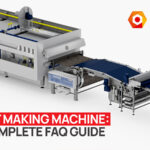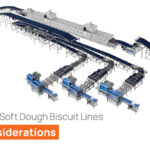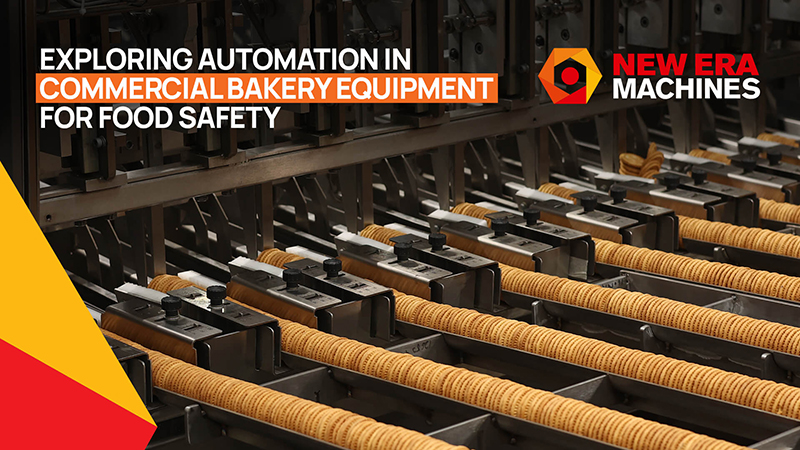The confectionery and bakery products industry is the basis of the global food market. With high consumer demands and strict food safety regulations, the need for efficient and hygienic production processes has never been more serious.
This is where automation in commercial bakery equipment steps in.
The Role of Commercial Bakery Equipment
At the heart of any bakery lies its equipment. From industrial baking ovens to industrial tunnel ovens, these machines are the backbone of production. However, their role extends beyond mere production; they are crucial in ensuring food safety.
Commercial bakery equipment is more than just tools for production; they are critical components of a giant food safety system.
Let’s delve deeper into how:
1. Product Consistency and Quality:
Precise Baking Conditions: Industrial ovens, especially when automated, can maintain exact temperature, humidity, and baking time. This consistency prevents undercooked or overcooked products, significant food safety hazards.
Uniform Product Structure: Proper baking is crucial for product integrity. Equipment like industrial tunnel ovens ensures even heat distribution, preventing microbial growth pockets.
2. Hygiene and Sanitation:
Minimal Human Contact: Automated cleaning cycles in equipment like industrial tunnel ovens reduce the risk of human error and contamination.
Material Selection: Food-grade stainless steel and other non-porous materials used in commercial bakery equipment prevent bacteria buildup.
Temperature Control: Many equipment components operate at temperatures that inhibit microbial growth.
3. Allergen Management:
Dedicated Equipment: Specialized equipment can be used for allergen-containing products, preventing cross-contamination.
Cleaning Protocols: Stringent cleaning procedures, often aided by automation, ensure the removal of allergen residues.
4. Traceability:
Data Logging: Modern equipment can record crucial data like temperature, humidity, and production times. This information is essential for tracing potential contamination sources.
Ingredient Tracking: Some systems can integrate with inventory management to track ingredient usage, aiding in allergen and recall management.
5. Efficiency and Productivity:
Reduced Handling: Automated systems minimize product handling, reducing the risk of contamination.
Rapid Cooling: Equipment like blast chillers rapidly cool products, inhibiting bacterial growth.
6. Regulatory Compliance:
Proof of Safety: Data generated by equipment can be used to demonstrate compliance with food safety regulations.
HACCP Support: Many equipment features align with Hazard Analysis and Critical Control Point (HACCP) principles.
Automation: A Game-Changer
Automation in commercial bakery equipment is revolutionizing the industry. By integrating advanced technologies, bakery equipment manufacturers are developing machines that not only boost efficiency but also significantly enhance food safety.
Precision and Consistency
Industrial baking ovens equipped with automation can precisely control temperature, humidity, and baking time. This ensures consistent product quality, reducing the risk of undercooked or overcooked products, common culprits in foodborne illnesses.
Temperature and Humidity Control: Automated systems can maintain precise baking conditions, ensuring products are cooked thoroughly and consistently. This reduces the risk of undercooked products, a primary source of foodborne illnesses.
Ingredient Accuracy: Automated dosing and mixing equipment minimize human error, preventing inconsistencies that could compromise product safety.
Enhanced Hygiene and Sanitation
Automated cleaning cycles in industrial tunnel ovens and other equipment minimize human intervention, reducing the chances of contamination. Sensors can detect and alert operators to potential hygiene issues, enabling prompt action.
Automated Cleaning: Self-cleaning ovens and other equipment reduce the potential for human contamination.
Sterile Environments: Automated systems can create controlled environments, minimizing the risk of airborne contaminants.
Real-time Monitoring: Sensors can detect deviations from hygienic conditions, allowing for immediate corrective actions.
Traceability and Recall Management
Automation allows for meticulous tracking of ingredients, production processes, and equipment performance. This data is invaluable for identifying the source of any contamination and implementing corrective measures.
Data Logging: Automated systems can record detailed information about production processes, ingredients, and equipment performance. This data is essential for tracking products in case of a recall.
Allergen Management: Automated systems can prevent cross-contamination of allergens by segregating production lines and equipment. This is important for consumers with food allergies.
Reduced Human Error
Consistent Processes: Automation minimizes the potential for human errors in critical control points, such as temperature settings or ingredient measurements.
Improved Efficiency: By handling repetitive tasks, automation frees up human workers to focus on quality control and other critical areas.
Faster Response Times
Automation improves overall efficiency by optimizing production processes. This means less downtime, reduced waste, and increased output, allowing bakeries to meet growing demands without compromising safety.
Early Detection: Automated monitoring systems can quickly identify potential issues, allowing for rapid intervention.
Efficient Recall Processes: Detailed data logs facilitate efficient product tracing and removal.
By incorporating automation into commercial bakery equipment, manufacturers are not only improving productivity but also creating a safer food environment. This commitment to food safety is crucial for building consumer trust and complying with stringent regulations.
The Future is Automated
The confectionery and bakery products industry is on the cusp of a transformative era. As technology advances, we can expect to see even more sophisticated automation solutions in bakery machinery and equipment. From robotic arms handling delicate pastries to AI-powered quality control systems, the possibilities are endless.
By embracing automation, bakery equipment manufacturers and operators can not only stay ahead of the competition but also contribute to a safer and more sustainable food supply chain. It’s a win-win for everyone involved, from producers to consumers.


